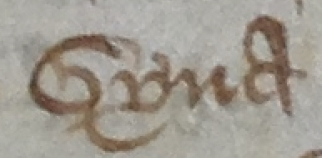Gyna Russell
Referred to in records as: “Gyna”, “Judea”, “Judea Russell”, “Judeam”, “Judee”.
Brief biography

Gyna, first recorded in the Close Rolls as
the Jewess Russell,married twice. Her first husband Abraham Russell, a Jewish chirographer of Wilton, was often in trouble with Christian authorities—and likely with his wife as well! The Patent Rolls record that in 1253, he was found guilty of coin clipping but acquitted after payment of a fine, while in 1256 he paid another fine for pardon of his alleged affair with a Christian woman called Letitia de Cerfmenistre. In the same year, in the wake of conspiring with the mayor of Wilton in
fraud and other evils(for which the mayor was hanged), Abraham fled the country and took Gyna with him. Gyna returned to England alone in 1259, urged to do so by the
solicitation of friends.On payment of 40 gold bezants to his wife Eleanor of Provence, King Henry III had pardoned her of any involvement in her husband’s crimes and protected her from further accusation and harassment. By 1276, Gyna had remarried, one hopes much more happily.
When the Exchequer of the Jews launched an inquest into her possible possession
of her first husband’s chattels (which should have gone to the king when he was outlawed
shortly before fleeing), the charge was handled by her new husband Moses of Kent. Moses, acting as Gyna’s attorney, claimed
that the couple had nothing of Abraham’s, and a Jewish jury found this to be true.
Abraham’s belongings, the jurors determined, did indeed go to the king when he and
Gyna
fled England. Moreover, Abraham had died while fugitive, shortly before Gyna returned
to
her
peaceful residence in England.Though this jury also submitted that Abraham and Gyna had
crossed the seawhen they fled, it is possible that Gyna had spent time in Scotland during her absence. The Exchequer of the Jews also had some reason to suspect that she might be in possession of a gold cup that belonged to King Alexander III of Scotland, the husband of Henry III’s daughter Magaret. A mixed jury of Christians and Jews found that this final accusation was also untrue, but the suspicion suggests that Gyna may have been in the company of Scottish royalty.
Further reading
- Great Britain. Court of Chancery. Calendar of the Patent Rolls Preserved in the Public Record Office Henry III, AD 1247-1258. London: H.M. Stationery Office, 1908, pp. 184; 532.
- Hillaby, J. and C. Hillaby, The Palgrave Dictionary of Medieval Anglo-Jewish History. London: Palgrave. 2015, s.v. Chirographs and Chirographers, p. 100.
- Rokéah, Zefira Entin, Money and the Hangman in Late-13th-Century England: Jews, Christians and Coinage Offenses Alleged and Real (Part II), Jewish Historical Studies 32 (1990-1992): 159–218, at 169.
Dates mentioned in records
1259–1276
Locations
Wiltshire, Huntingdonshire

